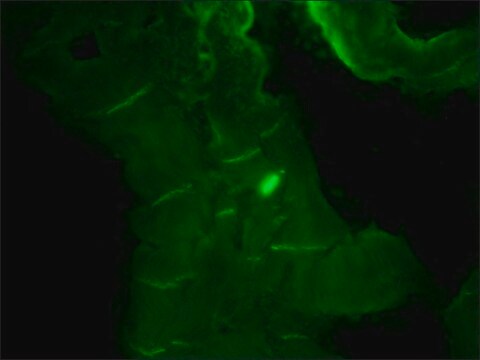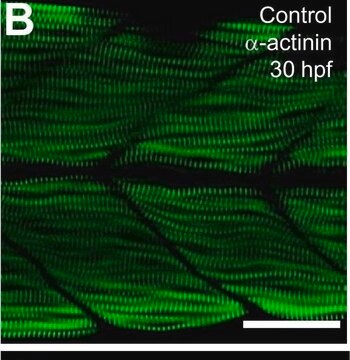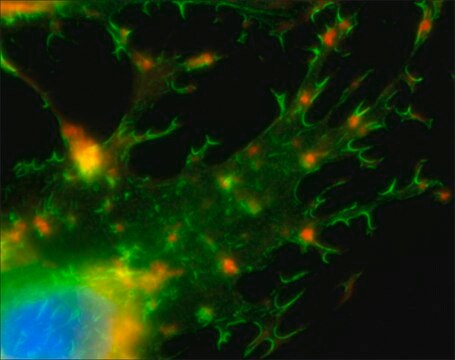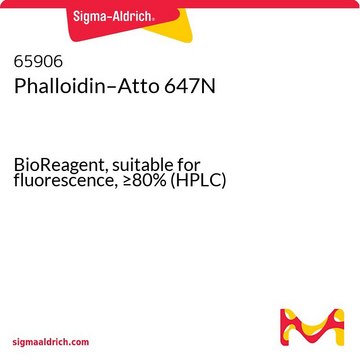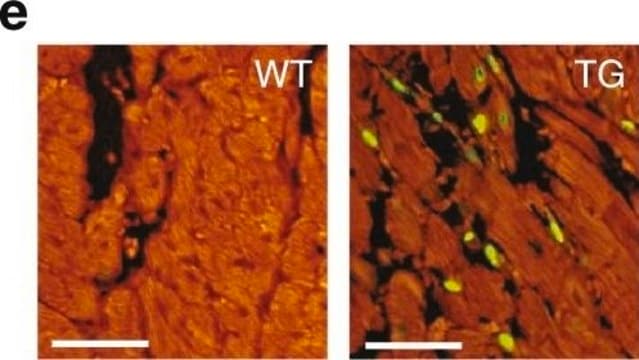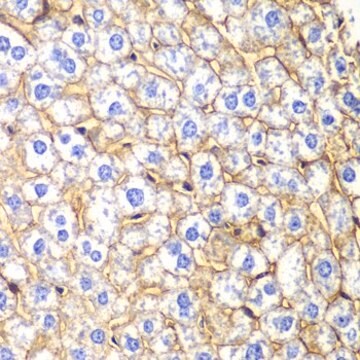추천 제품
생물학적 소스
rabbit
결합
unconjugated
항체 형태
whole antiserum
항체 생산 유형
primary antibodies
클론
polyclonal
분자량
antigen 135 kDa
포함
15 mM sodium azide
종 반응성
rabbit, cat, chicken, human
기술
immunohistochemistry (formalin-fixed, paraffin-embedded sections): 1:1,000 using protease-digested animal heart sections
indirect immunofluorescence: 1:100 using cultured MDBK cells
western blot: 1:200
UniProt 수납 번호
배송 상태
dry ice
저장 온도
−20°C
타겟 번역 후 변형
unmodified
유전자 정보
chicken ... CDH2(414745)
일반 설명
Cadherins are glycoprotein receptors that regulate Ca2+-dependant adhesion in cells. Cadherins are associated with adherens junctions and are mainly involved in morphogenesis of cells and tissues. P-cadherin is expressed in epithelial cells and its over-expression has been associated with breast cancer metastasis and invasion . Anti-Pan Cadherin antibody is specific for cadherins in a wide range of organisms including chickens, rabbits and rats.
특이성
The epitope recognized by the antibody is shared by a wide variety of organisms.
면역원
Synthetic peptide corresponding to the C-terminal amino acids of chicken N-Cadherin with an extra N-terminal lysine residue (24 amino acids) coupled with glutaraldehyde to keyhole limpet hemocyanin (KLH).
애플리케이션
Anti-Pan Cadherin antibody is suitable for use in confocal immunofluorescence using rat ventricular myocytes and western blot (1:200). The antibody may also be used for indirect immunofluorescence (1:100 using cultured MDBK cells) and immunohistochemistry (in formalin-fixed, paraffin-embedded sections or at 1:1,000 dilutions using protease-digested animal heart sections). Additionally, the product can be used in indirect immunoblot (135 kDa band in chicken or rabbit heart extracts), immunoperoxidase and immunoelectron-microscopy assays.
May be used for the detection of members of the cadherin family or genetically engineered proteins containing the C-terminal cadherin tail, and for demonstration of adherens type cell-cell junctions regardless of their cadherin type.
면책조항
Unless otherwise stated in our catalog or other company documentation accompanying the product(s), our products are intended for research use only and are not to be used for any other purpose, which includes but is not limited to, unauthorized commercial uses, in vitro diagnostic uses, ex vivo or in vivo therapeutic uses or any type of consumption or application to humans or animals.
적합한 제품을 찾을 수 없으신가요?
당사의 제품 선택기 도구.을(를) 시도해 보세요.
Storage Class Code
12 - Non Combustible Liquids
WGK
nwg
Flash Point (°F)
Not applicable
Flash Point (°C)
Not applicable
Sang-Jin Lee et al.
Cell death & disease, 7(10), e2431-e2431 (2016-10-21)
Skeletal myogenesis is coordinated by multiple signaling pathways that control cell adhesion/migration, survival and differentiation accompanied by muscle-specific gene expression. A cell surface protein Cdo is involved in cell contact-mediated promyogenic signals through activation of p38MAPK and AKT. Protein kinase
Larissa Fabritz et al.
Journal of the American College of Cardiology, 57(6), 740-750 (2011-02-05)
We used a murine model of arrhythmogenic right ventricular cardiomyopathy (ARVC) to test whether reducing ventricular load prevents or slows development of this cardiomyopathy. At present, no therapy exists to slow progression of ARVC. Genetically conferred dysfunction of the mechanical
André Albergaria et al.
The International journal of developmental biology, 55(7-9), 811-822 (2011-12-14)
P-cadherin is a cell-cell adhesion molecule, whose expression is highly associated with undifferentiated cells in normal adult epithelial tissues, as well as with poorly differentiated carcinomas. Its expression has been already reported in human embryonic stem cells and it is
Bo Li et al.
Development (Cambridge, England), 136(19), 3267-3278 (2009-09-09)
Wnt signalling is required for neural crest (NC) induction; however, the direct targets of the Wnt pathway during NC induction remain unknown. We show here that the homeobox gene Gbx2 is essential in this process and is directly activated by
Heyjin Lee et al.
International journal of molecular sciences, 18(12) (2017-12-21)
Cachexia and sarcopenia are the main causes of muscle atrophy. These result in a reduction in the muscle fiber area, myo-protein content, and muscle strength, with various molecular modulators being involved. Although several reports have proposed potential therapeutic agents, no
자사의 과학자팀은 생명 과학, 재료 과학, 화학 합성, 크로마토그래피, 분석 및 기타 많은 영역을 포함한 모든 과학 분야에 경험이 있습니다..
고객지원팀으로 연락바랍니다.
